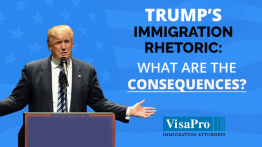Introduction
The United States economy and its consistent ability to achieve innovation has long been the envy of the global marketplace. This time-tested brand of success is rooted strongly in the U.S. economy’s ability to attract and retain the strongest employees from both within the country and around the world. The continued success of the U.S. to dominate on an international scale, then, is contingent upon the unimpeded functioning of the U.S. immigration system. This is especially important with regard to the prominence of STEM related jobs in the 21st century economy. As the demand for these jobs grows, domestic workers have proved insufficient to fill the multitude of vacant positions. Immigration reform is an essential component of the American economic brand. In order to incentivize high-skilled workers to contribute and continue to grow our economy, there must be repeated calls for bipartisan immigration reform. Facilitating the immigration process for highly skilled workers is one of many steps that the U.S. must take to maintain economic competitiveness in the burgeoning global market.
American Dominance In STEM Fields
It might seem odd to suggest that the U.S. needs to focus energy on attracting foreign workers when statistics indicate that unemployment is at an all-time low. Yet these statistics are misleading with regard to a few critical fields. While general unemployment might be low, the U.S. is not producing enough workers to fill in jobs that require a strong educational background in a STEM field. For instance, a striking 54% of persons holding doctorates in either computer science or information management in the United States are foreign nationals. On a related note, certain highly skilled blue-collar jobs like machinists and technicians also display employment statistics that are at odds with the robust economic performance of the U.S. in recent years. These shortages, if not tended to, will inevitably contribute to the U.S.’s declining ability to compete with countries like India and China, which are growing their economy through a targeted campaign of developing precisely these lucrative STEM background fields that the U.S. is struggling to maintain.
What Is A Potential Solution?
To make up for these shortcomings, many employers have turned to the global community to fill in critical positions as U.S. based companies. While this solution seems fruitful for all parties involved, the attitude of the current administration toward immigrants has created unnecessary friction between these employers and the international community. Just last year, U.S. based companies filed 190,098 petitions, including 95,855 were filed on behalf of foreign-born professionals who had earned a graduate degree from a U.S. university. Despite the large numbers of highly qualified workers eager to contribute to the U.S. economy, only 85,000 were actually approved due to outdated annual caps on H-1B visas. Many of these petitions are from American based tech giants like Amazon, Google, Apple and Microsoft, companies whose extraordinary success strengthens the foundation of the American economy. These caps fail because among other things, they do not take employer demand into account. Imposing arbitrary caps on H-1B visas is just one of many political relics in contemporary American immigration policy that fails the modern worker and employer.

Is There A Need For A Change In Attitudes Toward Immigration?
This low approval rating sends a discouraging message to highly skilled professionals who have much to contribute to the U.S. economy. Up until recently, the U.S. has been the undisputed global leader in innovation in STEM fields. According to a report by the NSF, the United States conducts more science and engineering research than any other nation and spends an impressive $497 billion annually to support these efforts. By prioritizing a misguided sense of nationalism over common sense immigration policies, the U.S. is inadvertently pushing the strongest workers in the international community into the arms of their competitors. This attitude is certainly not sustainable if the U.S. wants to maintain its already tenuous position as the global leader in STEM research.
Conclusion
Amidst the uncertainty and conflict surrounding the state of the U.S. immigration system, there is one constant variable: the fact that the U.S. is in desperate need of fresh and talented STEM educated workers. If you have a desire to immigrate to the U.S. but have found yourself wary of the xenophobic rhetoric of the current administration and its shifting immigration policies, it is important to remember that all hope is not lost. Not all Americans share these beliefs, and companies seeking highly skilled workers will welcome them with open arms- regardless of nationality.
At VisaPro Law Firm, we believe in the power of immigrants to change a country for the better. Our attorneys make lessening the burden of the immigration process for highly skilled workers a priority. If you are interested in moving to the U.S. to pursue your career, consider getting in touch with VisaPro Law Firm today for a Free Immigration Consultation. We will combine our expert knowledge with the details of your case to create a personalized immigration strategy under new immigration policy that will have you working in the U.S. in no time.
What VisaPro Customers Are Saying
[VisaPro legal team] was incredibly knowledgable and extremely helpful throughout the process. We were exceptionally impressed with how they have combined the great personal and communication skills they bring and also technology with a highly intuitive website which guides you and keeps you updated throughout the process……..This is a true testimonial, I would highly recommend VisaPro to anyone looking for guidance and success in this area."
 Paul Lyons, President, Atlas Intelligence Inc
Paul Lyons, President, Atlas Intelligence Inc



